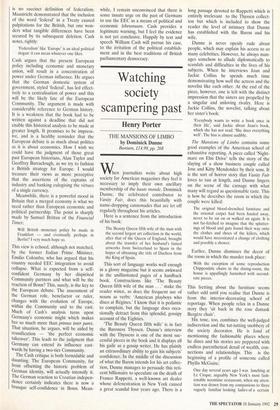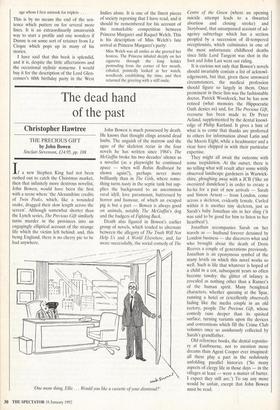Watching society scampering past
Henry Porter
THE MANSIONS OF LIMBO by Dominick Dunne Bantam, £14.99, pp. 268 When journalists write about high society for American magazines they feel it necessary to imply their own ancillary membership of the haute monde. Dominick Dunne, the celebrated contributor to Vanity Fair, does this beautifully with name-dropping cannonades that are let off regularly throughout his articles.
Here is a sentence from the introduction of his book:
The Beauty Queen fifth wife of the man with the second largest art collection in the world, after that of the Queen of England, brought about the transfer of her husband's famed artworks from Switzerland to Spain in the hopes of obtaining the title of Duchess from the King of Spain.
This sort of language works well enough in a glossy magazine but it seems awkward in the unillustrated pages of a hardback book. Constructions like 'The Beauty Queen fifth wife of the man . . .' make the reader wince, as does the frequent use of nouns as verbs: 'American playboys who disco at Regines.' I know that it is pedantic to complain, but the language does occa- sionally detract from this splendid, gossipy account of the Eighties.
'The Beauty Queen fifth wife' is in fact the Baroness Thyssen. Dunne's interview with the Thyssens is one of the most suc- cessful pieces in the book and it displays all his guile as a gossip writer. He has plainly an extraordinary ability to gain his subjects' confidence. In the middle of the discussion of what the Baron intends for his art collec- tion, Dunne manages to persuade this reti- cent billionaire to speculate on the death of Franco Rappetti, a well-known art dealer whose defenestration in New York caused a great scandal four years ago. There is a long passage devoted to Rappetti which is entirely irrelevant to the Thyssen collect- ion but which is included to show the reader the level of intimacy that Dunne has established with the Baron and his wife.
Dunne is never openly rude about people, which may explain his access to so many celebrities. However, he always man- ages somehow to allude diplomatically to scandals and difficulties in the lives of his subjects. When he interviews Joan and Jackie Collins he spends much time demonstrating how well the actress and the novelist like each other. At the end of the piece, however, one is left with the distinct impression that the sisters are propelled by a singular and unloving rivalry. Here is Jackie Collins, the novelist, talking about her sister's book:
'Everybody wants to write a book once in their life', said Jackie about Joan's book, which she has not read. 'She does everything well'. The hiss is almost audible.
The Mansions of Limbo contains some good examples of the American school of exhaustive reporting. A piece called 'Night- mare on Elm Drive' tells the story of the slaying of a show business couple called Jose and Kitty Mendendez by their sons. It is the sort of horror story that Vanity Fair loves to run at length, and Dunne lingers on the scene of the carnage with what many will regard as questionable taste. This is how he describes the room in which the couple were killed:
The original blood-drenched furniture and the oriental carpet had been hauled away, never to be sat on or walked on again. It is not far-fetched to imagine that the splatter- ings of blood and guts found their way onto the clothes and shoes of the killers, which would have necessitated a change of clothing and possibly a shower.
Earlier, Dunne dismisses the decor of the room in which the murder took place:
With the exception of some reproduction Chippendale chairs in the dining-room, the house is appallingly furnished with second- rate pieces.
This fretting about the furniture seems rather odd until you realise that Dunne is from the interior-decorating school of reportage. When people relax in a Dunne story they 'sit back in the rose damask Bergere chair'.
His tone, too, combines the well-judged indiscretion and the tut-tutting snobbery of the society decorator. He is fond of mentioning the fashionable places where he dines and his stories are peppered with endless parenthetical detail of wealth, con- nections and relationships. This is the beginning of a profile of someone called Phyllis McGuire:
One day several years ago I was lunching at Le Cirque, arguably New York's most fash- ionable noontime restaurant, when my atten- tion was drawn from my companions to three vaguely familiar looking ladies of a certain age whom I first mistook for triplets ...
This is by no means the end of the sen- tence which putters on for several more lines. It is an extraordinarily amateurish way to start a profile and one wonders if Dunne is on some sort of retainer from Le Cirque which pops up in many of his stories.
I have said that this book is splendid, and it is, despite the little affectations and the occasional stylistic nonsense. I would buy it for the description of the Lord Glen- conner's 60th birthday party in the West Indies alone. It is one of the finest pieces of society reporting that I have read, and it should be remembered for his account of the remarkable competition between Princess Margaret and Raquel Welch. This is his description of Miss Welch's late arrival at Princess Margaret's party:
Miss Welch was all smiles as she greeted her hostess. The Princess inhaled deeply on her cigarette through the long holder protruding from the corner of her mouth, exhaled, pointedly looked at her watch, wordlessly establishing the time, and then returned the greeting with a stiff smile.



















































 Previous page
Previous page